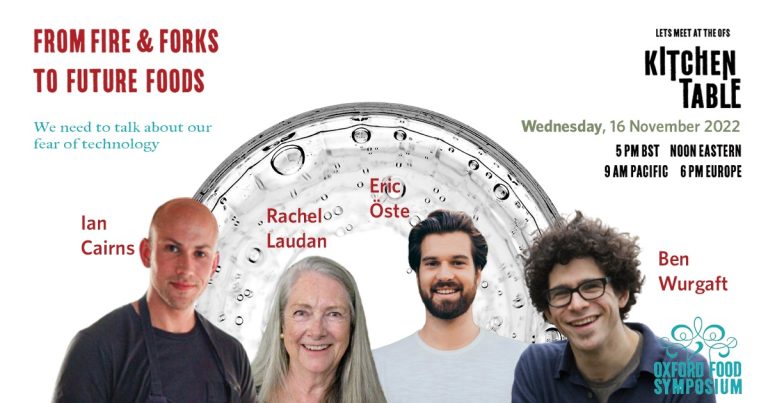
From Fire to Fork to Future Foods – digest from the chatline
From Fire and Forks to Future Food was the subject of an OFS Kitchen Table held on Wed 16th November. Hosted by Trustee Priya Mani with guests Rachel Laudan, Ben Wurgaft, Ian Cairns and Eric Öste, what follows is an edited version of the lively questions (and a few answers) contributed by fellow guests to the chatline.
WHAT IS ‘MODERN’ FOOD?
Modern food is food processed by ‘non-animate’ energy – i.e. fake meat. Meat-eating signifies elitism and masculinity, which means there’s a sociological element to meat-eating. Animal-derived protein has always been important, but now we’re in a place where there are too many choices and voices.
When we ask ourselves whether the food we eat is healthy, socially okay and morally pleasing – do we cut back on meat? Do we add other animals to the choice? Do we go forward to lab-grown protein?
The language of future food often tends to focus on “beyond meat”. Replacements for existing proteins can also cause considerable sustainability issues*.
The problem is not only tissue-culture as a medical process, there’s also the problem of registering intellectually property which makes it had to ensure the transparency essential to acceptance.
Pastoralists are not the problem it’s industrialised meat which uses land…..for feed crops, fertilisers and changes land use. The amount of meat eaten in the developed world is excessive. Less meat, more thoughtfully raised, game where populations threaten ecosystems, more creative and delicious recipes that encorporate plant-based protein-rich ingredients like pulses.
Regenerative farming has a role for all farm animals – so realistically it’s about eating less meat (a treat, similar to the past) and moving away from industrial farming which is bad for people and the planet.
Are a lot of innovators genuinely looking to serve the common good, or make massive profits? Venture capital needs to produce profit in the short term. Is the lab-grown initiative motivated by altruism or economics or something in between?
Perhaps our fear of technology in food production is exacerbated by our distrust of government to regulate it. Transparency is key. Let’s by all means develop new, non-meat or non-dairy products, but just not call meat or cheese!
HOW DO WE MAKE OUR CHOICES?
Modern industrial food presents the paradox of choice. Fossil-fuel energy fueled the change to modern food, leading to breadth of choice and quality, and the thousands of items in an American grocery store.
The paradox extends to moral, aesthetic and spiritual choices. And whether the choices are good for the community. The number of advice-givers and information available is now enormous, causing further confusion.
The result is that many people are now so disconnected from their food – how it’s produced and appears in their supermarket – they have no way to assess the role they play.
Modern industrial food expands access – it’s democratic food. It’s important that MacDonalds democratised meat-eating – not the best meat, not fancy, but at least there’s a choice. So if the cost of meat goes way up, do we return to a hierarchy of access? Underpaid serfs eating veg while the top one per cent eats meat – and high quality meat, at that?
If technology is the answer, we need to look at our economic model. In the global south, there’s a huge difference in access to any meat of any kind, let alone high quality – no matter how democratic access has become.
WHERE DO WE GO FROM HERE?
We are uncomfortable with what comes out of laboratories in a way we are not with kitchens. We don’t know how all these things are made, so perhaps we need to see the evidence of human interaction in what we eat.
Businesses that innovate should be obliged to recognise environmental obligations. Environmental concerns need to be framed as economic concerns. Of course the motivation is profit: the huge increase in the sale of ‘vegetarian and vegan’ foods is profit-driven. People are just trying to survive and build a business. There can be guard-rails applied to ensure rules are followed.
In California “vertically farmed” greens – salads, spinach, etc – are increasingly popular. But there are issues in terms of energy consumption, and we don’t yet know the long-term effects on human health of food grown under artificial chemically-enhanced conditions. And the farms could be also vulnerable to sabotage.
Although there issues with non-traditionally grown foods and the fertilizers used in vertical farms have not been assessed in any kind of long-term study, there’s a good chance they are similar to greenhouse growers, which have been used for decades.
The main difference is the fiber-content: baby kale vs lacinato from the field. There are so many unknowns in the value of ‘naturally-occurring soil’ rather than putting together nutrients to feed crops in very controlled environments. There’s also the question of microbiome/soil quality as previously discussed with David Montgomery and Anne Biklé.
Let’s talk about the connection between innovation, scale and waste. For instance, whey [a by-product of the dairy-industry] was always used in pig rearing and in the making of ricotta and similar whey-cheeses. And it has potential as a natural, sustainable fertilizer on a large scale. It’s also being repurposed into new CPG products by the company Sparefood
Many traditional farm economies used waste. Whey for pigs, certainly, but also nigari from salt-making to make tofu, etc. And coffee-grounds for growing mushrooms. And the sugar cane industry uses bagasse [waste product] as fertiliser.
Corporations are as scared as us as we are of them. Demand transparency.
THE LAST WORD
“According to my microbiologist sister there is no difference between cooking and lab science.”
* For information on what a cultured meat maker is doing to create chicken out of lab-grown cells, go to:
https://www.fda.gov/media/163261/download
For info on Scottish farmers looking for ways to grow protein without animals, go to: https://stockfreefarming.org/leafu-what-this-novel-food-could-mean-for-scottish-agriculture/
